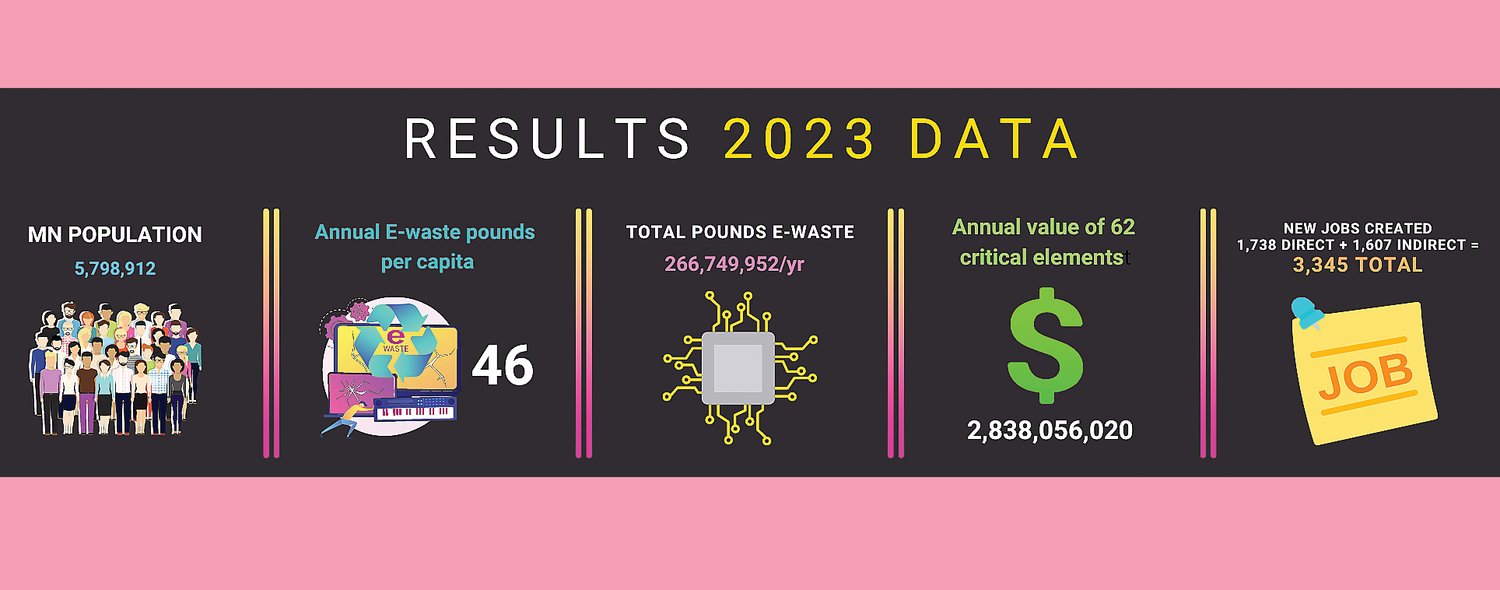Support the Timberjay by making a donation.
Study suggests big job gains from new kind of mining
State support for recycling e-waste could generate nearly 1,800 jobs statewide
REGIONAL— A new pilot study suggests a new type of “mining” could create more than 1,700 direct jobs in Minnesota and help address the country’s need for valuable metals like …
This item is available in full to subscribers.
Attention subscribers
To continue reading, you will need to either log in to your subscriber account, below, or purchase a new subscription.
Please log in to continue |
Study suggests big job gains from new kind of mining
State support for recycling e-waste could generate nearly 1,800 jobs statewide
REGIONAL— A new pilot study suggests a new type of “mining” could create more than 1,700 direct jobs in Minnesota and help address the country’s need for valuable metals like copper and silver.
The study, conducted by a Macalester College in partnership with Repowered and the Iron Range Partnership for Sustainability, concluded that a more concentrated, statewide effort to recycle the valuable metals contained in electronic devices could also generate about $2.8 billion in annual revenue, creating a major value-added industry for the state.
“In public conversations about mining, we only usually talk about mining for virgin metals, but there are a lot of opportunities to reuse the metal that’s already been dug out of the ground, and it seems wholly irresponsible to not look there first before we alter even more landscapes and communities,” said Professor Roopali Phadke, who is one of the study’s principal investigators and a scholar of environmental politics and policy at Macalester College.
Researchers with the study had two primary questions to answer: how much electronic waste (also known as e-waste) is actually generated in Minnesota each year, and how much of it can feasibly be recycled.
Using peer-reviewed research, market prices of metals, and local data on e-waste, the researchers found that there is real potential in e-waste recycling. If 100 percent of the 266 million pounds of e-waste generated in Minnesota each year were captured for recycling or refurbishment, the effort would generate:
• 1,738 direct jobs.
• 78 million pounds of valuable metals.
• Enough copper for 155,000 electric vehicles.
• Enough silver to produce 441,000 solar panels.
Iron Range Partnership for Sustainability President Marlise Riffel noted that her organization has long advocated for sustainable jobs on the Iron Range. “Because e-waste has no foreseeable endpoint, this is a golden opportunity to harvest all we can from this resource. Capturing value from 100 percent of the e-waste we generate is a win-win for jobs, revenue, and the environment.”
The researchers argue this pilot study, which is based in part on data from Repowered’s St. Paul e-waste recycling facility, demonstrates the need for a more comprehensive review of every e-waste facility in Minnesota.
A real policy commitment, like legislation providing free and accessible e-waste collection, would contribute to the circular economy of metals and would put Minnesota at the head of the pack among states.
“There is an ethical problem here. We can’t just keep making stuff without paying attention to the ingredients that go into the stuff,” said Phadke.“I am sympathetic to the Republican argument that, right now, our supply of metals comes from places that are known for human rights abuses and all kinds of dirty politics. And, so, we should consider obtaining these metals from our own backyard, but we can’t do it by just green-lighting every mining project and trespassing over Native treaties to get those metals. E-waste might be a real solution.”






